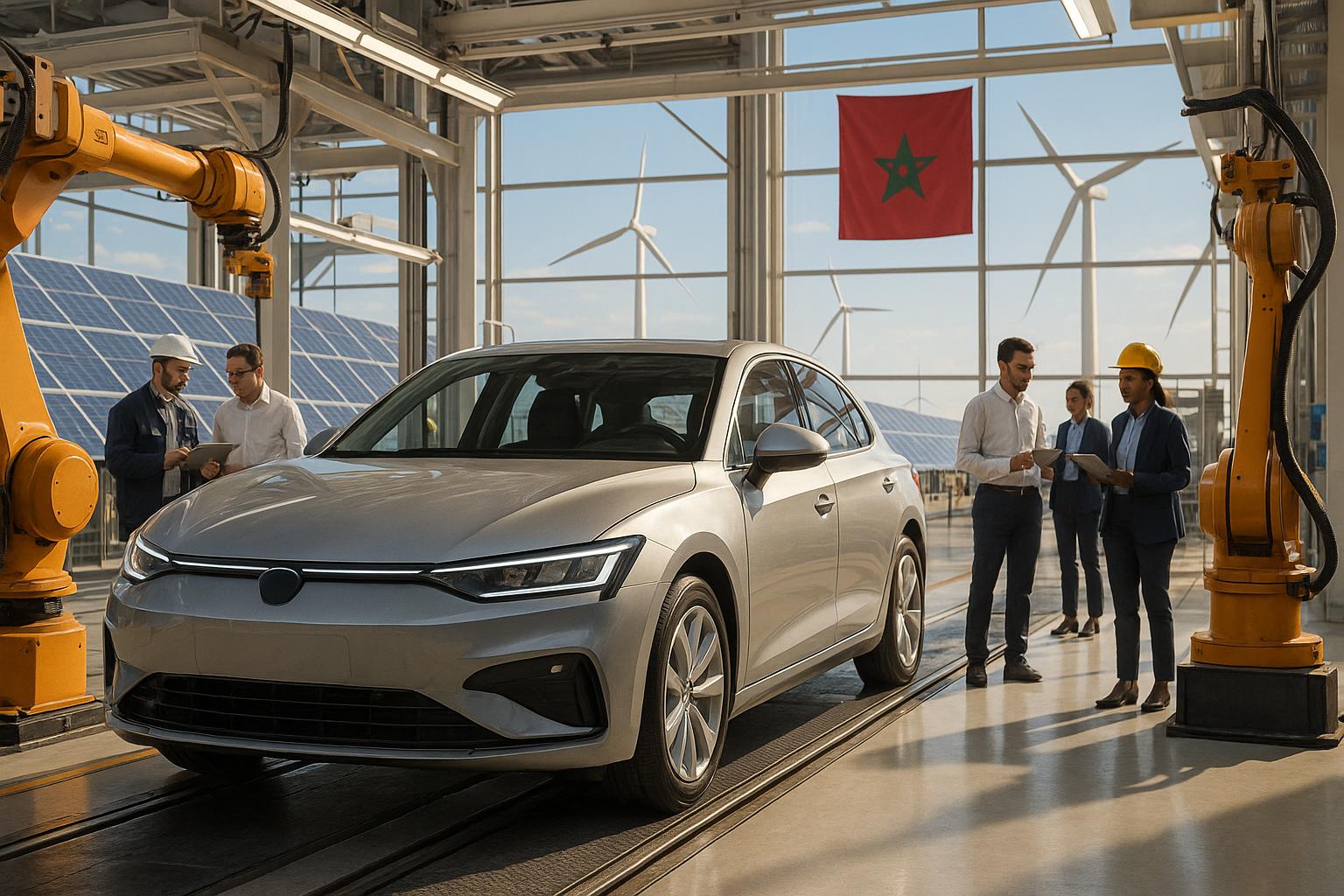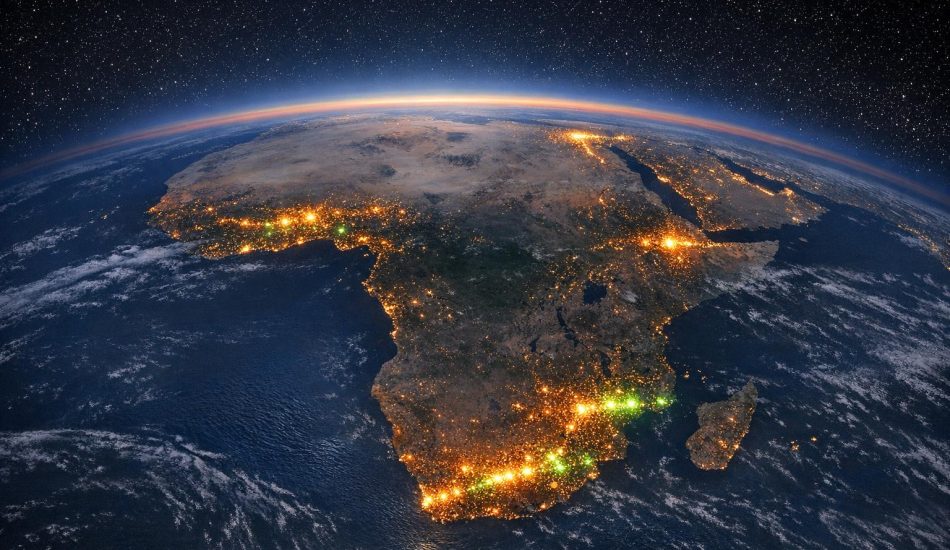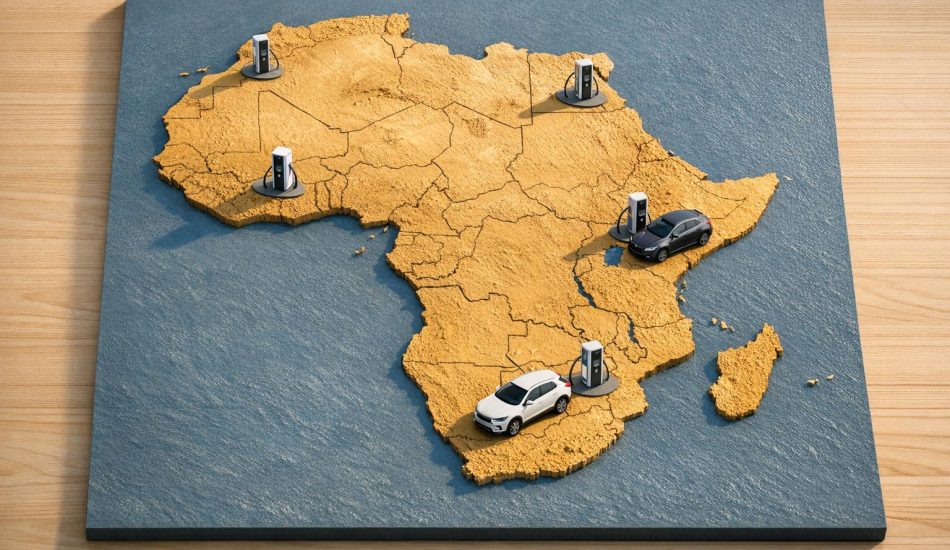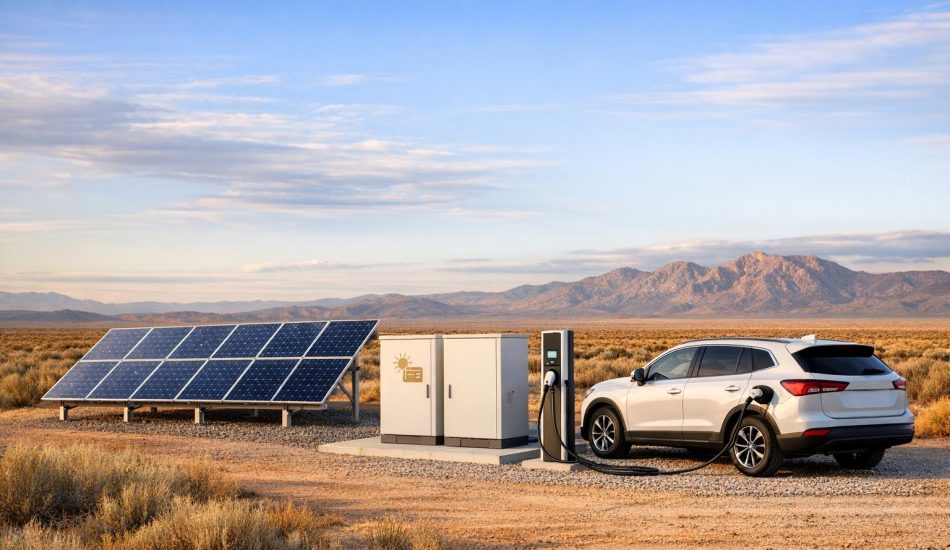
Morocco is positioning itself as North Africa’s leader in electric vehicle (EV) manufacturing. Here’s why:
- Government Support: Morocco offers tax breaks, simplified regulations, and infrastructure investments under its National Electric Mobility Strategy.
- Global Partnerships: Major automakers like Renault and Stellantis have already invested in Morocco.
- Prime Location: Close to Europe, Africa, and the Middle East, with access to over one billion consumers.
- Renewable Energy: Nearly half of Morocco’s energy comes from solar and wind, reducing manufacturing emissions.
- Advanced Infrastructure: Facilities like Tangier Med port and Tangier Auto City streamline production and exports.
Compared to Egypt and Algeria, Morocco stands out with its focus on EV-specific policies, renewable energy, and industrial readiness. While Egypt has a larger domestic market, its EV infrastructure is underdeveloped. Algeria, on the other hand, lacks targeted policies and global partnerships.
Quick Comparison:
| Country | Strengths | Weaknesses |
|---|---|---|
| Morocco | Strong policies, renewable energy, global partnerships | Smaller domestic market |
| Egypt | Large market, competitive labor costs | Weak EV infrastructure, limited global partnerships |
| Algeria | Potential market access, renewable energy potential | Lack of EV policies, minimal foreign investment |
Morocco’s proactive approach has made it a standout choice for automakers aiming to expand in North Africa.
1. Morocco
Infrastructure
Morocco boasts a well-developed logistics network that plays a key role in its economic growth. Its major seaports, such as Tangier Med and Casablanca, collectively handle over 30 million TEUs annually. This enables smooth importation of raw materials and efficient export of finished vehicles. Thanks to its strategic location, Morocco offers quick shipping times – cargo from Tangier can reach Paris in just 36 hours, while shipments to New York may take as little as five days.
Morocco is also investing heavily in its electric vehicle (EV) infrastructure. By 2026, the government plans to install 2,500 public charging stations. On top of that, a $2.3 billion investment by 2024 will fund the creation of the first power battery industrial zone and Africa’s first two-wheeled EV battery production facility. In early 2025, Morocco’s energy generation reached nearly 12 GW, with 5.4 GW coming from renewable sources. To further strengthen its energy capabilities, the country will allocate 27 billion MAD over the next five years to expand its power networks. These efforts solidify Morocco’s position as both a logistics and production hub, ensuring a strong foundation for export operations.
Export Markets
Morocco’s strategic location gives it access to nearly one billion consumers. Its integrated transport network – spanning roads, railways, and overland routes – enables quick and reliable delivery across North Africa and beyond.
A shining example of Morocco’s industrial success is Tangier Auto City. This facility is recognized as one of the world’s top ten automotive manufacturing bases, showcasing the country’s ability to build world-class industrial infrastructure.
2. Egypt
Government Policies
Egypt has been working to attract international manufacturers and strengthen its local automotive industry. To achieve this, the government has focused on creating free zones and industrial cities designed to encourage investment in vehicle assembly. However, when it comes to electric vehicles (EVs), Egypt’s initiatives are less developed compared to Morocco’s. These policy limitations play a key role in shaping the type of foreign investments the country attracts in its automotive sector.
Foreign Investment
Over the years, Egypt’s automotive sector has seen several international partnerships. However, economic challenges have steered these investments primarily toward conventional vehicle assembly rather than EV production, reflecting the country’s slower progress in adapting to industry shifts.
Infrastructure
Egypt’s strategic location, with major ports on the Mediterranean and Red Sea, along with the Suez Canal, provides significant trade advantages. However, infrastructure issues, like grid instability and a lack of EV charging stations, limit its ability to fully capitalize on these benefits. Unlike Morocco, which has made strides in EV infrastructure, Egypt still faces major obstacles. While renewable energy projects are being developed, more work is needed to improve energy reliability and logistics to support energy-intensive industries like EV manufacturing.
Export Markets
Egypt’s position offers access to key markets across Africa, the Middle East, and Europe. Despite trade agreements and a large domestic market, political uncertainties and evolving logistics challenges hinder its export potential. With its EV readiness still in its early stages, Egypt lags behind Morocco in tapping into the growing EV market in North Africa.
3. Algeria
Government Policies
Algeria has the potential to emerge as a key player in the Mediterranean automotive industry. However, the country’s heavy reliance on traditional energy sectors has left it trailing in the development of policies or initiatives specifically aimed at electric vehicles (EVs).
Foreign Investment
Information regarding Algeria’s efforts to attract foreign investment in its EV sector is sparse. There’s little evidence of incentives or regulations designed to draw in global players.
Infrastructure
Unlike Morocco, which boasts a well-documented and integrated transport network, Algeria lacks detailed data on its logistical and industrial infrastructure for EV manufacturing. This gap makes it harder for the country to capitalize on its strategic location for export opportunities.
Export Markets
While Algeria’s position offers theoretical access to both European and African markets, its ability to compete in the EV export market remains largely untested.
Morocco’s Automotive Industry is Paving Way for EV Dominance | Firstpost Africa

sbb-itb-99e19e3
Advantages and Disadvantages
Each North African nation offers a unique mix of strengths and hurdles when it comes to electric vehicle (EV) manufacturing. These factors shed light on why Morocco has taken the lead in the region’s EV aspirations. Below is a table that outlines the key advantages and disadvantages of Morocco, Egypt, and Algeria, followed by a more detailed analysis.
| Country | Advantages | Disadvantages |
|---|---|---|
| Morocco | • Strong government support through EV-focused policies • Partnerships with major automakers like Renault and Stellantis • Advanced industrial infrastructure and efficient transport networks • Prime location for accessing European and African markets • Expanding renewable energy capacity • Skilled workforce with automotive expertise |
• Relatively small domestic market compared to Egypt |
| Egypt | • Large domestic market exceeding 100 million people • Significant investments in renewable energy • Strategic geographic position linking Africa, Asia, and Europe • Competitive labor costs • Established industrial base in other sectors |
• Limited experience in automotive manufacturing • Fewer partnerships with global EV companies • Early-stage infrastructure for EV production • Economic instability affecting foreign investment • Underdeveloped supply chain networks |
| Algeria | • Mediterranean location offering access to European markets • Potential for renewable energy growth • Comparatively large domestic market • Government interest in diversifying the economy |
• Heavy dependence on traditional energy industries • Lack of EV-specific policies and initiatives • Minimal foreign investment in automotive manufacturing • Weak industrial infrastructure for EV production • Limited collaboration with global automakers |
Morocco: The Regional Leader
Morocco’s success stems from a combination of proactive government policies, strong global partnerships, and a well-established industrial ecosystem. These factors have attracted significant investments from major automotive players, setting the country apart from its regional counterparts. Its strategic location and growing renewable energy capacity further enhance its appeal as a manufacturing hub for both European and African markets.
Egypt: Potential Yet to Be Realized
Egypt’s large domestic market presents a significant opportunity for local EV production. However, the country faces challenges in building the necessary infrastructure and attracting international partnerships. While its renewable energy investments are promising, Egypt needs to channel this progress into concrete initiatives tailored to the automotive sector. Strengthening its supply chain and industrial base will be crucial for long-term success.
Algeria: Untapped Potential
Algeria, despite its strategic location and market size, lags behind due to a lack of targeted EV policies and limited foreign investment. The country’s reliance on traditional energy sectors and underdeveloped industrial infrastructure further hinder its ability to compete as a regional EV hub. Without significant reforms and partnerships with global automakers, Algeria’s potential in this space remains largely unrealized.
Conclusion
Morocco is emerging as a key player in North Africa’s electric vehicle (EV) manufacturing landscape, making the most of its strategic advantages to push the industry forward.
With its advanced infrastructure and business-friendly policies, Morocco stands out when compared to regional peers like Egypt and Algeria. These strengths give the country a clear edge, but maintaining this progress will require ongoing policy support and steady investment.
FAQs
What steps has the Moroccan government taken to attract electric vehicle manufacturers?
The Moroccan government is taking bold steps to establish the country as a key player in electric vehicle (EV) manufacturing. To attract manufacturers, they’ve introduced tax breaks, VAT reductions for EV imports, and set up industrial free zones that simplify regulations and provide operational perks.
On top of that, Morocco is aiming to produce 100,000 EVs by 2025. To meet this goal, they’re offering purchase subsidies to boost local adoption and support exports. With significant investments in renewable energy and a prime geographical location, Morocco is positioning itself as an appealing hub for global automakers looking to expand their EV operations.
How does Morocco’s focus on renewable energy make it a strong candidate for EV manufacturing?
Morocco’s Renewable Energy Push and Its Role in EV Manufacturing
Morocco is making bold strides in renewable energy, positioning itself as a top contender for electric vehicle (EV) manufacturing. The country is channeling significant investments into solar and wind energy, aiming to generate 52% of its electricity from renewable sources by 2030. This focus on clean energy ensures a reliable and affordable power supply, a critical factor for running EV production facilities and battery plants efficiently.
On top of that, Morocco has set its sights on doubling its electricity capacity by 2030, with 80% of the new capacity coming from renewables. This shift not only cuts reliance on fossil fuels but also drives down production costs while aligning with global sustainability initiatives. These developments highlight Morocco as a forward-focused destination for companies eager to invest in the growing EV market.
What obstacles does Morocco face in growing its electric vehicle market compared to other countries in the region?
Morocco is grappling with several obstacles as it seeks to grow its domestic market for electric vehicles (EVs). One of the main issues is the lack of sufficient charging infrastructure, which can deter potential buyers who worry about the convenience of owning an EV. On top of that, the higher upfront cost of EVs compared to traditional gas-powered cars makes them less attainable for many consumers, especially in a market where affordability plays a significant role in purchasing decisions.
Another pressing challenge is building awareness and encouraging EV adoption among the public. Although Morocco has made notable progress in renewable energy and manufacturing, creating a strong local demand for EVs will require a multi-pronged approach. This includes offering targeted incentives, launching educational campaigns, and implementing supportive government policies. Tackling these barriers will be essential for Morocco to position itself as a leader in the EV market within North Africa.




